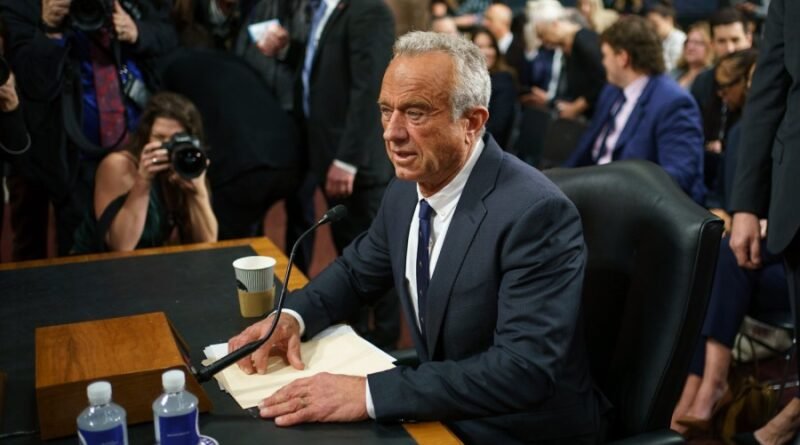Senate confirms RFK Jr. as Health secretary; McConnell lone GOP dissenter
Longtime vaccine critic Robert F. Kennedy Jr. is now the nation’s top health official, after the Senate on Thursday voted almost entirely on party lines to confirm him atop a department of nearly 100,000 employees that run 13 agencies.
The 52-48 confirmation vote brings to a close a contentious three-month confirmation fight that served as a significant test of the Republican Party’s loyalty to President Trump.
Only Sen. Mitch McConnell (R-Ky.) cast a GOP vote against Kennedy’s confirmation, after previously bucking his party on Trump’s defense secretary and national intelligence director.
The founder of one of the country’s most prominent anti-vaccine groups will now run the nation’s vaccine policy, which is just one part of the nearly $2 trillion federal health portfolio.
The final vote was essentially a formality, after the Senate Finance Committee last week sent Kennedy’s nomination to the floor on a party-line vote. The full chamber on Wednesday voted 53 to 47 along party lines to end debate and advance the nomination.
Four Republicans would have needed to break with their party and vote with every Republican for Kennedy’s nomination to fail. Instead, only one did. Sens. Susan Collins (R-Maine) and Lisa Murkowski (R-Alaska), who opposed Pete Hegseth’s nomination to lead the Pentagon, this week said they would support Kennedy despite their lingering concerns over his stance on vaccines.
McConnell, a polio survivor, did not meet with Kennedy ahead of his confirmation hearings. Late last year, he broadly criticized efforts to revoke approval of the polio vaccine.
Without mentioning Kennedy by name, McConnell said that “anyone seeking the Senate’s consent to serve in the incoming administration would do well to steer clear of even the appearance of association with such efforts.”
Kennedy is a former Democrat, but he has support of essentially all Republican lawmakers in Congress. They’ve brushed aside concerns over his anti-vaccine activism and past pro-abortion comments, instead praising him for being a disruptor to the health care industry.
They’ve embraced Kennedy’s Make America Healthy Again agenda, including eliminating food additives and his pledge to refocus health agencies on chronic conditions instead of infectious diseases.
During the confirmation fight, liberal groups spent more than $1 million on a campaign targeting key GOP senators thought to be potential swing votes. Kennedy was also opposed by a group founded by former Vice President Mike Pence, which attacked him for being pro-abortion.
Yet Kennedy’s alliance with Trump coincided with Republicans deciding to go all-in on the president’s Cabinet nominees, no matter how controversial. How the process played out underscores how wary Republicans are of incurring Trump’s wrath only weeks into his administration.
Major anti-abortion groups remained relatively quiet, and some even gave him tentative backing. Many in the health industry also stayed on the sidelines, depriving Democrats of powerful — and deep-pocketed — allies. Kennedy has promised to target drugmakers and doctors’ groups, but they largely remained silent.
During a pair of contentious confirmation hearings, Kennedy denied he was anti-vaccine, despite refusing to disavow his promotion of a link between vaccines and autism. Instead, Kennedy painted himself as pro-vaccine safety, contending that vaccines aren’t tested enough, something experts say is not true.
He also displayed a lack of awareness on some basic health policy issues; for instance, he stumbled on explanations about core health programs, like Medicaid and Medicare, and the difference between the two.
His vaccine comments troubled some lawmakers, including Sen. Bill Cassidy (R-La.). Cassidy is an ardently pro-vaccine doctor who had expressed serious doubts about whether Kennedy was qualified to lead the agency, primarily over his stance on autism and vaccines.
Cassidy openly questioned whether the 71-year-old Kennedy “who spent decades criticizing vaccines, and who’s financially vested in finding fault with vaccines” can change his attitudes and approach “now that he’ll have the most important position influencing vaccine policy in the United States?”
But after spending a weekend talking to Kennedy and Vice President Vance, the politically vulnerable Cassidy ultimately voted with his other GOP colleagues after saying he received last-minute assurances over vaccine safety.
Up until the final vote, Democrats excoriated Republicans, sounding the alarm about what Kennedy’s agenda will mean for the nation’s health.
“A vote for RFK Jr. is a vote for a sicker America,” said Sen. Ron Wyden (D-Ore.), part of a series of coordinated floor remarks by Democrats in opposition. “In my view this is the least qualified nominee to ever be nominated for a position of this importance.”
Sen. Patty Murray (D-Wash.) said Republicans “should know better. They do know better.”
But, she said, “they are looking the other way. They are choosing to pretend like it is in any way believable that RFK Jr. won’t use his new power to do exactly the thing he has been trying to do for decades — undermine vaccines.”
